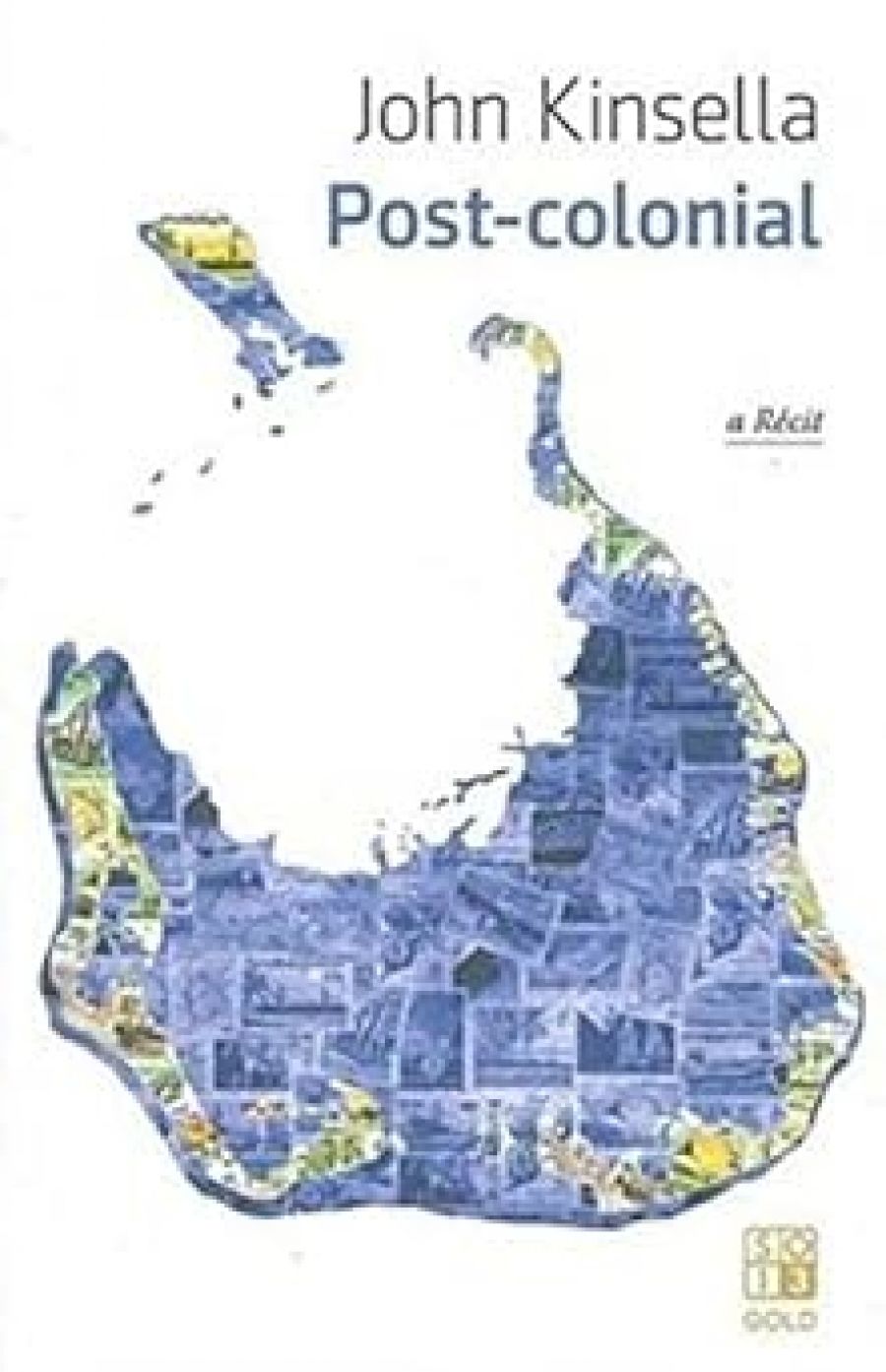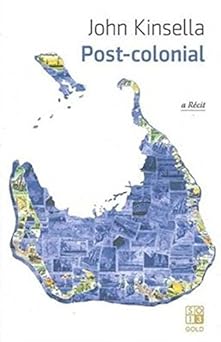
- Free Article: No
- Contents Category: Cultural Studies
- Review Article: Yes
- Article Title: Intersections
- Online Only: No
- Custom Highlight Text:
Is the exercise of judgment the reason for a book review? I hate the idea of that. I would rather experiment with the genre by asking if it can add something to the book, like a mole or a prosthesis. In the process, could one also say something about how the book works, as it moves through its various environments, collecting other growths? I think John Kinsella would appreciate this eco-critical move, for what it ultimately wants to interrogate is the way the book sustains its life. And then, having confessed to that vitalist position, may I go on to ask what the book has to say about Life? Why not tackle the big issue, the writer’s vision?
- Book 1 Title: Post-Colonial
- Book 1 Subtitle: A récit
- Book 1 Biblio: soi 3 gold, $29.95 pb, 234 pp
- Book 1 Cover Small (400 x 600):

So Kinsella’s book attempts to have it both ways, lying as it does at the intersection of theory and literature, not to mention the old colonial seaways of the Indian Ocean where the tiny islands become his literary laboratory. The islands are famous for having been in the hands of the Clunies-Ross family until they were sold to the Australian government in 1978. There are snip-pets of history scattered across the archipelago of stories: you never know quite what is real history or not. Did Rimbaud really visit? It’s possible he did, on his return from Java.
The ‘post-colonial’ theory appears as strange references twisted out of shape and rendered into poetry. Our narrator tells us, for example, that he is savouring Derrida, or announcing in a letter to no one: ‘Caught up in the critical moment here. As an Australian of Scottish-Irish-English heritage, I am the referent through and against which these people define their struggle. There’s a rank humanism in this, or maybe the pseudo-humanism of the post-colonialist – finding further binaries in context, caught up in the betrayals of the colonised taking on the voices of the masters. Hodge and Mishra and others talk of Rushdie in this “context” … I can’t resist. It makes me sick.’
The subtitle: a récit. A story composed of the arch and literary prose poetry that I read as the contemporary voice of Kinsella; and as well the memoir of ‘David’, who spent time on the islands in the 1980s or 1990s, which is like a reprise of the Kinsella of the autobiographical Auto (2001), but not nearly as entertaining as that frenzied down-and-out drug and alcohol spree. The David of this récit has nothing going for him, and the writing is flat. But when it is interrupted by the poetic voice, the book comes to life again, not least in the crazy originality: ‘Epode’ subtitles a fragment which goes on, ‘The smoking bells of peace. Knees shaking under the table. Crossing borders extinguishes customs; this mantle of fertility as sterile as the beard shaved off, washed into others’ sewers.’
What kind of life is this promoting? Let me answer by pointing to another barnacle on the book as ship or conveyor of literary life. This is the beautiful cover, composed in blue of fragments of Cocos (Keeling) Islands stamps (no doubt a significant source of revenue in the philately trade). What is informative about this is that the distribution of colour gives the impression of a sinking atoll of islands, which might well be the case; it certainly is in the Maldives.
But this ecological framework is not highlighted in the book’s vision. Crabs and other creatures get a mention, sure, but the opportunity is missed to have them speak in their own scratchy, scuffling and flapping way (i.e. a new aesthetic framework) about a world disappearing under the sea. Rather, we are treated to the late romantic hubris of a poet whose self-obsession pastiches fame-by-association with figures such as Rimbaud, just as Brett Whiteley did a few years earlier. So if Whiteley, on drugs, could get away with mobilising the nineteenth-century decadents ‘with one hand waving free / Silhouetted by the sea’, you just can’t keep it up in the twenty-first, pasting old material into a half-rejected post-colonial framework.
In this century the crabs must have their say, and the coral reefs, in this century when the world must speak in a more-than-human language. Then our songs will be composed like Ariel’s father, of bones of coral and ‘pearls that were his eyes’. Things don’t fade in that remarkable world, but rather trans-mute into ‘something rich and strange’, which Kinsella’s book would have done had he taken the care to write something more contemporary, as in certain passages where we get a sense of what might have been. And what is now; for the other glaring absence is the fact that such islands are on asylum-seeker sea routes.
Early in the book, Kinsella describes everything he can see in his own back-cover photograph, where he and the shore are braced against the wind: ‘The palm fronds are back as if ready to lash forwards, green fruit like nodal points for switching into another framework’. It is that other framework I kept wanting him to adopt, one allowing glimpses of realities and intersecting forms of life.


Comments powered by CComment